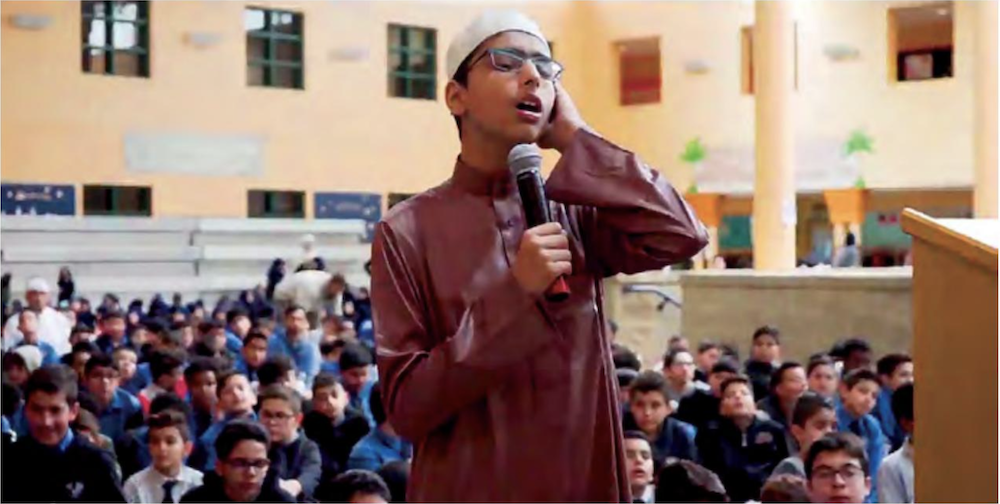Schools across Canada, mandated to prepare for in-person classes in September 2020, were provided with firm government-regulated mandates
By Mona Hennawi
May/June 2023

Islamic schools in Canada have evolved over the years and are now at the forefront of education for Muslim students. Overall, their provision of a balanced education that incorporates both Islamic studies and a high-quality education have made them well-respected for their academic standards and for instilling in their students a strong sense of Islamic values and morals.
The Edmonton Islamic Academy (EIA; Edmonton, Alberta), one of the country’s leading and largest Islamic schools, was established in 1987. Originally located in Al-Rashid Mosque’s basement with 21 students, it now enrolls more than 1,700 students from preschool to Grade 12.
The academy strives to show students their world from an Islamic perspective in order to preserve the religious and cultural identities reflected in their Islamic beliefs and values. Taking this responsibility seriously, its staff seeks to create an atmosphere in which students feel loved, safe, nurtured and encouraged to excel academically. As a result, their high school is considered the city’s second best.
The staff’s attention to academic success is always within the context of Islam and toward a way of life taught by Prophet Muhammad (salla Allahu ‘alayhi wa sallam). Students take part in schoolwide prayers, adhere to the appropriate Islamic dress code and respect the guidelines of a proper Islamic social life. The academy aims to establish an environment free from distractions and negative pressure so that its students can focus on their academic success.
The EIA follows the province’s Alberta Programs of Study in all its core subjects: language arts, mathematics, science, social studies and early literacy. Students are also taught Islamic, Quranic and Arabic studies. Representing over 45 nationalities, students receive a well-rounded education that emphasizes character development and offers numerous opportunities to develop their leadership skills. The school’s mission — to provide an education of the highest quality embedded in Islam’s values — is to enable its students to become respectful, responsible and successful leaders and contributors to society.
Like many other schools, Canada’s Islamic schools were impacted by the Covid-19 pandemic. Teachers and students had to adapt to online learning overnight from March to June 2020. This quick, unexpected transition to online learning was not easy for the EIA community as a whole, as it involved adapting the curriculum to a digital format and ensuring that all students had access to the necessary technology.
Schools across Canada, mandated to prepare for in-person classes in September 2020, were provided with firm government-regulated mandates. The EIA’s board of trustees and leadership team worked diligently to ensure that the mandated protocols were prepared and ready for implementation on the first day of the school year. Faced with the dynamic and complex challenges of Covid-19, the EIA’s administration did its best to mitigate risks and offer the best quality Islamic education possible. A reentry handbook was drafted to provide their stakeholders with the information, protocols and recommendations pursuant to the province’s K-12 School Reentry Plan.
Following the Ministry of Education and Alberta Health Services’ guidance, their planning gave direction to in-class learning as outlined in the government’s reentry scenarios in such areas as risk mitigation, teaching and learning, as well as divisional support for their school. To prevent Covid-19’s spread, strict policies — face masks, social distancing, staggered prayers and staggered dismissals, along with regular sanitization processes in the classrooms and the building — were implemented and adhered to without compromising the EIA’s pre-pandemic high-quality standard of education.
The EIA invested in technology to support online learning, offered additional support to families who needed it and found new ways to foster community via virtual and other events and activities. Nevertheless, even with the best measures in place, replacing a student’s normal and natural way of learning with distance learning and lockdowns negatively impacted their academic and social development. Teachers observed gaps in learning development in young students’ fine and gross motor skills, literacy and numeracy skills, socializing skills and struggles to transition from off-screen to in-person learning.
Helping some students and parents deal with mental health issues developed during the pandemic was another aspect facing the administration. In addition, some students, parents and teachers struggled with severe anxiety upon returning to the school and being part of a public setting.
The Academy also had to find new ways to maintain the strong sense of a close-knit community it had cultivated over the years and to keep students and families connected in the absence of physical gatherings. Once the EIA transitioned to online learning, its teachers continued to provide a high-quality education.
The future of Canada’s Islamic schools looks bright! “The Future of The Global Muslim Population,” a 2011 Pew Research Center report, estimates that 6.6% of all Canadians — approximately 2.7 million people — will be Muslim by 2030. Currently, Muslims make up about 2.8% of the country’s population. Given Islam’s status as Canada’s fastest-growing religion, and as its communities continue to grow, Islamic schools will be in high demand.
Islamic schools, an important part of Canada’s education landscape, provide a unique learning experience that incorporates both Islamic studies and secular education. They are preparing young Muslims to become well-rounded individuals who will contribute to Canada’s society and economy.
Mona Hennawi is the marketing and communications coordinator at Edmonton Islamic Academy, Canada.
Tell us what you thought by joining our Facebook community. You can also send comments and story pitches to horizons@isna.net. Islamic Horizons does not publish unsolicited material.